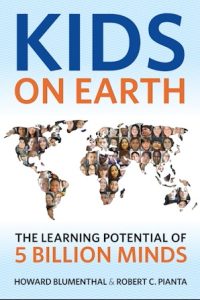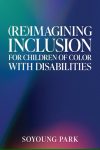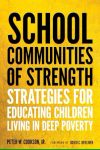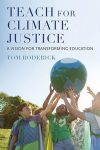
Reviewed by Eleanor J. Bader
When the 2025-2026 school year kicked off in September, 411,549 public school teaching positions were either unfilled or staffed by an instructor who was uncertified in the subject they’d been assigned to teach. This year alone, more than six million K-12 students – many of them newly arrived immigrants from every corner of the globe – will be impacted. Chandler Patton Miranda’s Sanctuary School not only decries this, but zeroes in on an alternative model of inclusive, welcoming education: A 31-school national consortium called the Internationals Network for Public Schools.
In order to write the book, Patton Miranda spent years at one facility in the Network, International High School (IHS) in New York City, as a participant-observer. She also interviewed dozens of IHS students, staff, teachers, administrators, parents, and alumni. The result is a comprehensive ethnography of an innovative, collaborative, and politically and socially engaged program.
The book introduces an array of instructors, many of whom are themselves immigrants, who are well-equipped with the skills necessary to work with newcomers. Their ability to empathize with their students is exemplary. Furthermore, Patton Miranda describes the faculty as willing to take risks, make mistakes, and constantly adapt the curriculum to meet evolving student needs. Collegiality and open communication, she reports, are woven into the school’s DNA.
Moreover, Sanctuary School details the ways that IHS, like other Network programs, is tailored to meet the individual political, legal, academic, and material needs of the diverse students who enroll. In addition, the faculty’s refusal to fast-track English-language acquisition or “teach to the test” means that the school sidesteps standardized evaluation and instead prioritizes experiential learning and students’ social and emotional well-being over grades and task completion. Similarly, IHS staff members are encouraged to work together and weigh in on all school governance decisions.
These factors make IHS and the Network schools covered by Sanctuary School both inspiring and impressive. It’s a wonderful, empowering read.
Sanctuary School: Innovating to Empower Immigrant Youth by Chandler Patton Miranda with and afterword by Carola Suarez-Orozco. Harvard Education Press, October 2025.
Reviewer bio: Eleanor J. Bader is a Brooklyn, NY-based journalist who writes about books and domestic social issues for Truthout, Rain Taxi, The Progressive, Ms. Magazine, the Los Angeles Review of Books, and The Indypendent.






